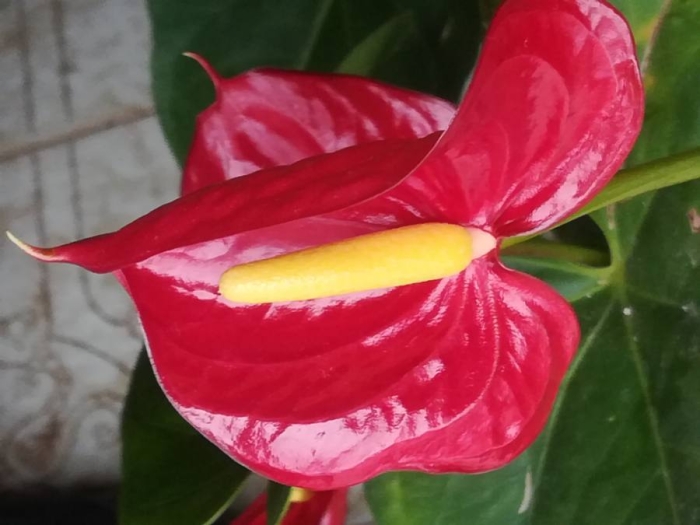Flamingo Flower
(Anthurium andraeanum)
Flamingo Flower (Anthurium andraeanum)
/
/

© Gianni Del Bufalo bygdb
CC BY 4.0
Image By:
© Gianni Del Bufalo bygdb
Recorded By:
Copyright:
CC BY 4.0
Copyright Notice:
Photo by: © Gianni Del Bufalo bygdb | License Type: CC BY 4.0 | License URL: http://creativecommons.org/licenses/by/4.0/ | Uploader: gianni_del_bufalo | Publisher: iNaturalist |

























Estimated Native Range
Summary
Anthurium andraeanum, commonly known as Flamingo Flower or Tail Flower, is a perennial herb native to the understory of tropical rainforests in Colombia and Ecuador. It typically grows to a height of 15-20 inches (38-50 cm) with a similar spread. The plant is characterized by its waxy, heart-shaped leaves and its distinctive flowers, which consist of a colorful spathe and a protruding spadix. The spathe is often red, pink, or white, and the spadix is usually a contrasting color, such as yellow or white. Anthurium andraeanum flowers throughout the year, with each bloom lasting up to several weeks, making it highly ornamental.
The Flamingo Flower is favored for its vibrant, long-lasting flowers and its ability to purify indoor air. It is widely cultivated as a houseplant and is also used in floral arrangements. In cultivation, it requires high humidity, consistent moisture without waterlogging, and thrives in bright, indirect light. It is best grown in a well-draining, peat-based potting mix. Anthurium andraeanum can be susceptible to root rot if overwatered and may attract pests such as aphids, mealybugs, and scale insects. It should be handled with care due to its toxic properties, which can cause irritation upon ingestion or skin contact. Despite these challenges, its striking appearance and air-purifying qualities make it a popular choice for indoor gardeners.CC BY-SA 4.0
The Flamingo Flower is favored for its vibrant, long-lasting flowers and its ability to purify indoor air. It is widely cultivated as a houseplant and is also used in floral arrangements. In cultivation, it requires high humidity, consistent moisture without waterlogging, and thrives in bright, indirect light. It is best grown in a well-draining, peat-based potting mix. Anthurium andraeanum can be susceptible to root rot if overwatered and may attract pests such as aphids, mealybugs, and scale insects. It should be handled with care due to its toxic properties, which can cause irritation upon ingestion or skin contact. Despite these challenges, its striking appearance and air-purifying qualities make it a popular choice for indoor gardeners.CC BY-SA 4.0
Plant Description
- Plant Type: Herb
- Height: 1-2 feet
- Width: 0.8-1 feet
- Growth Rate: Moderate
- Flower Color: Red
- Flowering Season: Summer, Fall
- Leaf Retention: Evergreen
Growth Requirements
- Sun: Part Shade
- Water: Medium
- Drainage: Medium
Common Uses
Border Plant, Low Maintenance, Potted Plant
Natural Habitat
Understory of tropical rainforests in Colombia and Ecuador
Other Names
Common Names: Laceleaf , Flamingo Lily , Oilcloth-Flower , Tail Flower
Scientific Names: Anthurium andraeanum , Anthurium andraeanum subsp. album , Anthurium andraeanum subsp. delicatissimum , Anthurium andraeanum var. album , Anthurium andraeanum var. amoenum , Anthurium andraeanum var. atrosanguineum , Anthurium andraeanum var. divergens , Anthurium andraeanum var. louisae , Anthurium andraeanum var. louisii , Anthurium andraeanum var. roseum
GBIF Accepted Name: